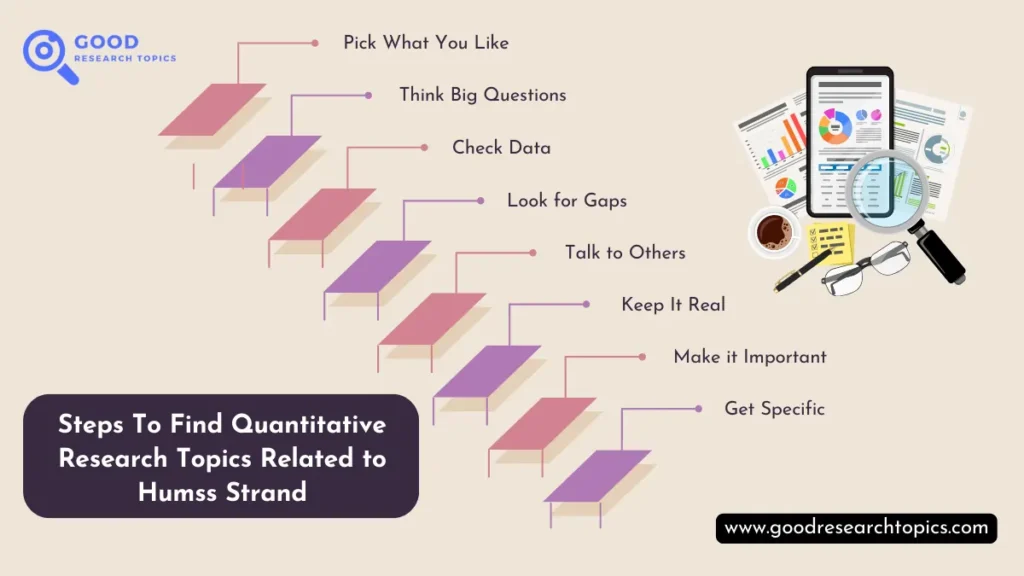Have you ever wondered how numbers can help us explore fascinating things about people, society, and the world around us? That’s exactly what Quantitative Research Topics Related to the Humss Strand do – it’s like a superpower that lets us understand human behavior and society using special numbers and tools.
In this exciting world of Humss (Humanities and Social Sciences), we dive into various topics that use numbers to uncover incredible insights. Imagine using these numbers to find out why education matters so much for landing a great job or how spending too much time on social media might affect how we feel inside.
We explore fantastic Quantitative Research questions, like whether everyone gets the same chances at work, why some places have more crime than others, or even how different cultures in schools influence how well students do in their classes. And that’s not all – we investigate how technology changes the way we communicate and how young people get involved in important decisions.
Quantitative research title in the Humss Strand is like a key that unlocks secrets about our society, helping us piece together a clearer picture of the world using these amazing numbers and tools.
What Is Quantitative Research Topics Related to Humss Strand?
Quantitative research in the Humss Strand means using numbers and data to study things like people, society, and how we all fit together. It’s like a special way of looking at different topics in subjects like Humanities and Social Sciences using numbers and counting to understand and discover cool things about our world. This type of research helps us find patterns, figure out how things are connected, and learn more about things like how education affects jobs, how technology changes how we talk to each other, and why some places might have more problems than others.
How Can I Find Good Quantitative Research Topics Related to Humss Strand?
Here are simplified steps for finding good quantitative research topics related to the Humss strand:

- Pick What You Like: Choose things you find interesting, like how people behave, different cultures, or the impact of technology.
- Think Big Questions: Ask yourself big questions, such as why education matters for jobs or how social media affects our feelings.
- Check Data: See if there are numbers or information available about the things you’re curious about. Data will help with your research.
- Look for Gaps: Find topics that haven’t been fully explored or understood yet. Find something new to explore.
- Talk to Others: Share your ideas with friends, teachers, or family. They might help you find new ideas or improve yours.
- Keep It Real: Make sure your topic is something you can actually study with the time and resources you have.
- Make it Important: Choose topics that can teach us more about society and why things are the way they are.
- Get Specific: Narrow down your idea to something specific so it’s easier to study and understand.
What Is A Research Topic Related To A Humss Student In Their Classroom?
Here’s a table outlining potential research topics related to the Humanities and Social Sciences (HUMSS) field that a student could explore within a classroom setting:
| Research Area | Potential Research Topics |
|---|---|
| History | Impact of a historical event on society |
| Sociology | Effects of social media on interpersonal relationships |
| Psychology | Mental health stigma in educational settings |
| Literature | Analysis of a particular literary work |
| Political Science | Influence of media on political ideologies |
| Economics | Income inequality and its societal effects |
| Anthropology | Cultural diversity in a local community |
| Philosophy | Ethics in modern technology |
| Geography | Urbanization and its environmental impact |
| Linguistics | Bilingual education and cognitive development |
List of 189+ Great Quantitative Research Topics Related to Humss Strand
Here are the most interesting Quantitative Research Topics Related to Humss Strand students.
12 Grade Quantitative Research Topics Related to Humss Strand
- Impact of class size on academic performance.
- Effectiveness of online learning versus traditional classroom learning.
- Factors influencing students’ choice of college major.
- Relationship between parental involvement and students’ academic success.
- The impact of standardized testing on students’ learning outcomes.
- Effects of school funding on educational quality.
- Analysis of the correlation between homework loads and student performance.
- Influence of teacher-student ratios on academic achievement.
- Comparing academic performance in single-gender versus co-educational schools.
- The relationship between extracurricular activities and academic success.
Easy Sociology and Culture Humms Research Topics
- Cultural assimilation versus cultural preservation in immigrant communities.
- Impact of social media on cultural perceptions and behaviors.
- Gender roles in modern society: Changing dynamics.
- Influence of pop culture on societal values and behavior.
- Attitudes towards interracial relationships in diverse societies.
- Analysis of family structures and their impact on child development.
- Factors contributing to social stratification and inequality.
- Social movements and their effectiveness in driving societal change.
- Perceptions and realities of poverty in urban communities.
- Impact of globalization on cultural diversity.
List of Interesting Psychology and Mental Health Quantitative Research Topics For Humms Students
- Correlation between social media use and mental health issues among adolescents.
- Factors influencing the development of eating disorders among youth.
- The relationship between parental styles and children’s mental health.
- Effects of bullying on mental health in schools.
- Psychological impacts of long-term unemployment.
- Stress levels among different age groups and its impact on mental health.
- Analysis of the stigma surrounding mental health and its effects on seeking help.
- Impact of mindfulness practices on reducing anxiety and stress.
- Correlation between music preferences and mental health outcomes.
- Effectiveness of therapy types for various mental health conditions.
Good Economics and Employment Quantitative Research Topics
- Gender wage gap across different industries and job roles.
- Factors influencing job satisfaction among employees.
- Effects of minimum wage changes on employment rates.
- Impact of globalization on job opportunities and employment patterns.
- Analysis of the gig economy’s effects on job security.
- The relationship between education levels and income inequality.
- Correlation between job automation and employment rates.
- Economic disparities in rural versus urban areas.
- Effects of unemployment on mental health and well-being.
- Factors influencing retirement age decisions among different demographics.
Politics and Governance Quantitative Research Title Related to Humss Strand
- Voter behavior and demographics: Understanding voting patterns.
- Youth political participation: Factors influencing engagement.
- Correlation between media coverage and public opinion on political issues.
- Effects of campaign spending on electoral outcomes.
- Analysis of representation and diversity in political leadership.
- Impact of government policies on income distribution.
- Corruption perception and its effect on trust in governance.
- Public opinion and attitudes towards immigration policies.
- Effects of gerrymandering on electoral fairness.
- Social media’s role in shaping political discourse and opinions.
Communication and Technology Research Topics About Hummms
- Impact of technology on family communication patterns.
- Social media’s influence on language and communication styles.
- Effects of smartphone usage on interpersonal relationships.
- Correlation between online gaming and social behavior.
- The role of influencers in shaping consumer behavior.
- Analysis of misinformation and its spread on social media platforms.
- Influence of digital media on political opinions and activism.
- Changes in news consumption patterns in the digital age.
- Technology’s impact on privacy perceptions and behaviors.
- Effects of virtual reality on empathy and social interactions.
Best Crime and Justice Quantitative Research Topics Related to Humss Strand
- Factors influencing juvenile delinquency rates.
- Impact of community policing on crime reduction.
- Correlation between poverty and crime rates.
- Effectiveness of rehabilitation versus incarceration in reducing recidivism.
- Relationship between drug legalization and crime rates.
- Analysis of racial disparities in the criminal justice system.
- Cybercrime trends and their impact on society.
- Effects of surveillance technology on crime prevention.
- Factors contributing to white-collar crime prevalence.
- Public perceptions of law enforcement and justice system fairness.
Environmental Studies Quantitative Research Topics For Humms Students
- Effects of climate change perceptions on individual behavior.
- Impact of environmental policies on pollution levels.
- Correlation between socio-economic status and environmental awareness.
- Analysis of recycling behavior in different communities.
- The relationship between urbanization and biodiversity loss.
- Effects of deforestation on local communities and ecosystems.
- Factors influencing renewable energy adoption.
- Environmental justice and its impact on marginalized communities.
- Public attitudes towards conservation and wildlife protection.
- Urban planning’s role in mitigating environmental challenges.
Health and Well-being Research Title About humms
- Correlation between lifestyle choices and overall health outcomes.
- Impact of public health policies on disease prevention.
- Effects of socioeconomic status on access to healthcare.
- Relationship between social support and mental health.
- Analysis of healthcare disparities in rural versus urban areas.
- Factors influencing vaccination acceptance and refusal.
- Nutrition habits and their effects on physical health.
- Public perceptions of alternative medicine and its effectiveness.
- Effects of exercise on mental health and well-being.
- The impact of sleep quality on overall health.
History and Society Quantitative Research Topics Related to Humss Strand
- Analysis of historical events’ impact on current societal norms.
- Effects of colonialism on contemporary societies.
- Correlation between historical education and national identity.
- The role of museums and memorials in shaping collective memory.
- Factors influencing generational differences in societal values.
- Effects of globalization on cultural heritage preservation.
- Historical trauma and its effects on communities.
- The impact of media representation on historical narratives.
- Public perceptions of historical figures and their legacies.
- The influence of historical literature on societal values.
Top Anthropology and Human Evolution Quantitative Research Topics Related to Humss Strand
- Cultural adaptation and its effects on human societies.
- Impact of migration on cultural diversity and traditions.
- Correlation between genetics and cultural behaviors.
- Effects of globalization on indigenous communities.
- Relationship between ancient civilizations and modern societies.
- Analysis of cultural rituals and their evolution over time.
- Factors influencing language evolution and diversity.
- The role of art in understanding ancient civilizations.
- Effects of urbanization on traditional cultural practices.
- Human-animal relationships and their cultural significance.
Geography and Urban Studies Quantitative Research Topics
- Correlation between urbanization and resource depletion.
- Impact of urban planning on community well-being.
- Effects of gentrification on neighborhood dynamics.
- Relationship between city infrastructure and economic growth.
- Analysis of migration patterns and their impact on urban landscapes.
- Factors influencing disaster resilience in urban areas.
- The role of public transportation in shaping urban development.
- Environmental impacts of rapid urbanization.
- Effects of tourism on local communities and ecosystems.
- Urban sprawl and its effects on biodiversity.
Linguistics and Language Studies Related Research Topics
- Correlation between language diversity and cultural identities.
- Impact of bilingual education on cognitive development.
- Effects of language evolution on communication styles.
- Relationship between language acquisition and brain development.
- Analysis of regional dialects and their cultural significance.
- Factors influencing language preservation efforts.
- The role of technology in language learning and communication.
- Effects of globalization on language standardization.
- Language ideologies and their impact on social interactions.
- Multilingualism and its effects on cognitive flexibility.
Philosophy and Ethics Research Title
- Correlation between moral values and societal norms.
- Impact of philosophical thought on modern ethics.
- Effects of ethical decision-making in professional settings.
- Relationship between cultural relativism and ethical judgments.
- Analysis of ethical dilemmas in emerging technologies.
- Factors influencing ethical consumption behaviors.
- The role of empathy in moral decision-making.
- Effects of moral education on behavior and decision-making.
- Ethical considerations in artificial intelligence development.
- Ethical implications of scientific research and experimentation.
Literature and Writing Studies
- Correlation between literature and cultural values.
- Impact of storytelling on societal beliefs and attitudes.
- Effects of censorship on literature and freedom of expression.
- Relationship between literature and social change movements.
- Analysis of literary genres and their cultural significance.
- Factors influencing reading habits and preferences.
- The role of literature in shaping identity and perception.
- Effects of translation on the interpretation of literary works.
- Literary representations of societal issues and conflicts.
- The influence of classic literature on modern society.
Religion and Belief Systems
- Correlation between religious beliefs and societal norms.
- Impact of religious diversity on interfaith relations.
- Effects of religious fundamentalism on social attitudes.
- Relationship between spirituality and mental well-being.
- Analysis of religious rituals and their cultural significance.
- Factors influencing religious conversion and retention.
- The role of religion in shaping moral values and ethics.
- Effects of secularization on societal institutions.
- Religious symbolism and its influence on cultural practices.
- The role of religion in political ideologies and governance.
Performing Arts and Media Studies
- Correlation between media representations and societal perceptions.
- Impact of performing arts on cultural heritage preservation.
- Effects of media influence on body image and self-esteem.
- Relationship between celebrity culture and societal values.
- Analysis of the role of music in shaping social movements.
- Factors influencing audience reception of media content.
- The role of theater in addressing societal issues.
- Effects of media censorship on freedom of expression.
- Portrayal of gender roles in performing arts and media.
- The influence of technology on entertainment consumption.
Archaeology and Historical Studies
- Correlation between archaeological discoveries and historical narratives.
- Impact of ancient civilizations on contemporary societies.
- Effects of archaeological tourism on cultural heritage preservation.
- Relationship between artifacts and cultural identities.
- Analysis of burial rituals and their cultural significance.
- Factors influencing the interpretation of archaeological findings.
- The role of technology in archaeological research and discoveries.
- Effects of looting and illegal excavation on historical preservation.
- Cultural exchanges and their impact on archaeological evidence.
- Human evolution and its connection to archaeological evidence.
Economics and Sociology Quantitative Research Topics Related to Humss Strand
- Correlation between economic growth and social development.
- Impact of social policies on economic inequality.
- Effects of globalization on labor markets and employment.
- Relationship between consumer behavior and societal norms.
- Analysis of wealth distribution and its societal implications.
- Factors influencing social mobility and economic opportunities.
- The role of social capital in economic prosperity.
- Effects of income disparity on social cohesion.
- Socioeconomic determinants of health outcomes.
What Is The Importance of Research In The Area of HUMSS?
Research within the Humanities and Social Sciences (Humss) holds significant importance for several reasons:
- Understanding People: Research in HUMSS helps us understand how people think, feel, and act in society.
- Solving Problems: It helps identify and find solutions to societal issues like poverty, inequality, and education challenges.
- Guiding Decision-Making: Research provides information that guides governments and organizations in making better decisions about policies and programs.
- Preserving Culture: It helps in preserving cultural heritage and traditions by studying how societies have evolved over time.
- Improving Lives: Research findings lead to improvements in education, healthcare, and overall quality of life by addressing social problems.
300+ Great Quantitative Research Topics Related to Humss Strand PDF
Here is the Quantitative Research Topics Related to Humss Strand pdf:
What Is A Research Topic Related To The Humss Strand Unresolved Problem?
These unresolved problems within the Humss Strand serve as significant research topics that require further investigation and attention to find effective solutions and strategies for improvement.
| Research Topic | Unresolved Problem |
|---|---|
| Education | Persistent Achievement Gaps |
| Sociology & Culture | Cultural Assimilation Challenges |
| Psychology & Mental Health | Stigma Surrounding Mental Health |
| Economics & Employment | Gender Wage Disparities |
| Politics & Governance | Youth Political Participation |
| Communication & Technology | Impact of Technology on Relationships |
| Crime and Justice | Racial Disparities in Criminal Justice |
| Environmental Studies | Urbanization’s Impact on Biodiversity |
| Health and Well-being | Socioeconomic Disparities in Healthcare |
| History and Society | Reconciliation of Historical Narratives |
| Anthropology and Human Evolution | Cultural Preservation Challenges |
| Geography and Urban Studies | Urban Planning for Sustainability |
| Linguistics and Language Studies | Language Preservation Efforts |
| Philosophy and Ethics | Moral Dilemmas in Technological Advancements |
| Literature and Writing Studies | Diversity in Literary Representation |
| Religion and Belief Systems | Interfaith Relations and Misunderstandings |
| Performing Arts and Media Studies | Media Representation Bias |
| Archaeology and Historical Studies | Preservation of Archaeological Sites |
Conclusion
Quantitative Research Topics Related to Humss Strand are like maps showing us amazing things about people and how we live. They help us understand why things happen and how we can make life better for everyone.
By exploring these topics, we learn cool stuff about schools, cultures, and why some things in society work the way they do. This knowledge helps us make smarter decisions about important stuff, like education and how to treat each other better.
When we study these topics using numbers and facts, we discover solutions to big problems, like poverty and unfairness. It’s like having a superpower to find answers that make life fairer and happier for everyone.
So, whether it’s understanding why some places have more problems than others or how technology changes the way we talk to each other, these research topics are key to unlocking secrets about society. They guide us in making things better by showing us where we need to focus our efforts. With these topics, we’re not just learning cool things; we’re finding ways to build a better world for everyone.



